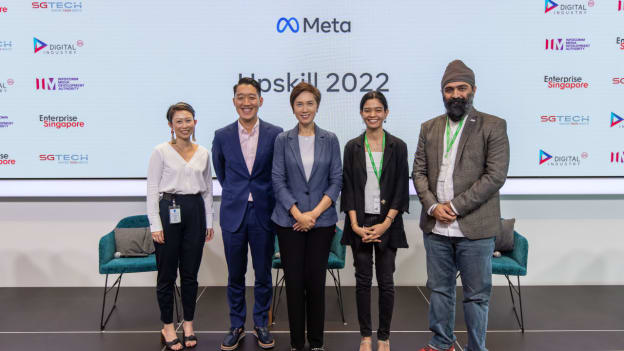The route to bringing people's digital skills forward

Within the next three or four years, as many as 115 million jobs will be created within the tech space globally: from tech-enabled roles such as e-commerce and digital marketing, to purely technical roles such as cybersecurity, cloud data, infrastructure, or software development. But whether those jobs can be filled is another matter.
“It's becoming increasingly challenging to find the talent that can fill those roles, and we think that need is actually only going to grow over the next few years,” said Damian Kim, Managing Director of Meta Singapore (above, 2nd from left). Speaking at the launch of Meta's expanded Upskill 2022 training initiative in Singapore earlier this week, he pointed to the exponential growth of digital consumers around Southeast Asia – 350 million as of end 2021 – as an indication of how great the need for digital skills is going to be.
At least part of that need will have to be filled by corporates or industry bodies going forward. Digital acceleration has shortened the lifespan of tech skills since before the pandemic: a common concern among the industry, job seekers, and observers has been that the typical three or four-year academic study course will lag behind the speed of digital transformation.
Singapore's Minister for Communications and Information Josephine Teo (above, centre) said of the need to make talent development initiatives industry-relevant: “I don’t think I can over-emphasise how important it is to get the companies’ involvement. The companies’ involvement makes a huge difference because the content that they cover is always going to be so much more current and relevant to the immediate needs, and when the participants know that the content is current and sought after by prospective employers, the motivation [to take the training and succeed] is certainly going to be a lot stronger.”
A transition step from academics to practice
Speaking to People Matters at the launch, Kim described Meta's Upskill as a complementary approach to the fundamentals that might be learned via the traditional academic route.
“We provide some additions or augmentations in terms of current day, real world practical applications,” he said. “There is coursework – people go through a curriculum – and there is also industry mentorship. People can learn from practitioners who are in the industry, they can work with companies who are running actual campaigns to generate demand, they can ask questions about how to apply skills or get peer and industry feedback on projects.”
That said, he added that the programme itself is not an employment initiative. “The intention is to help participants secure positions in the industry. But they are not put into those positions.”
According to figures from Meta, candidates who went through its Upskill initiative and received the corresponding, Meta-issued certification since its launch in 2021 have been noticeably more likely to obtain a job in the area they trained for – mainly digital marketing, which was the programme's main focus at its launch. The latest additions to the programme expand the available types of training and certification to software engineering.
The win-win proposition
“We started with digital marketing because that's where our expertise is, and it is also our business focus in Singapore,” Kim said of the programme's conception. “We are now evolving to add software engineering because simply, we're a tech company and we are increasing the number of technical roles we have here. And we see that there is a huge talent shortage for software engineering roles, cloud computing, AI, and other fields.”
Meta's Upskill, and other similar large corporate initiatives, are supported by the Singapore government for much the same reasons: the need to close skill gaps and develop local talent. Upskill itself is currently only offered in the Singapore market, and the majority of the learners in the programme come from small businesses, typically the business owners themselves and some key employees.
Going forward, Upskill and similar initiatives will provide people with that many extra options to pursue different paths, said Kim. These programmes won't displace traditional academic coursework, he noted – but they will make reskilling much more accessible to workers, and also make critical skills more accessible to companies.
“We're making this more than just a Meta programme,” he told People Matters. “We're working with the companies that we partner with, or that operate in the similar space. And what we're providing is good opportunities for people to refresh their skill sets in this dynamic industry, making it more accessible for people who want to pivot, including mid-career learners. Whether they are furthering their education or refreshing their knowledge or wholesale changing their line of work, I think it's certainly valuable for them to have that option.”
Image: Meta Upskill 2022 launch event
















